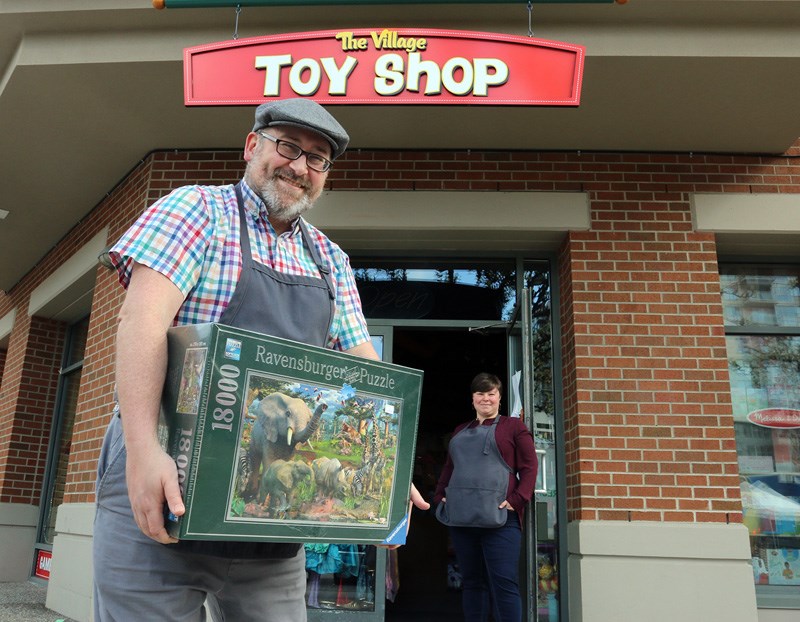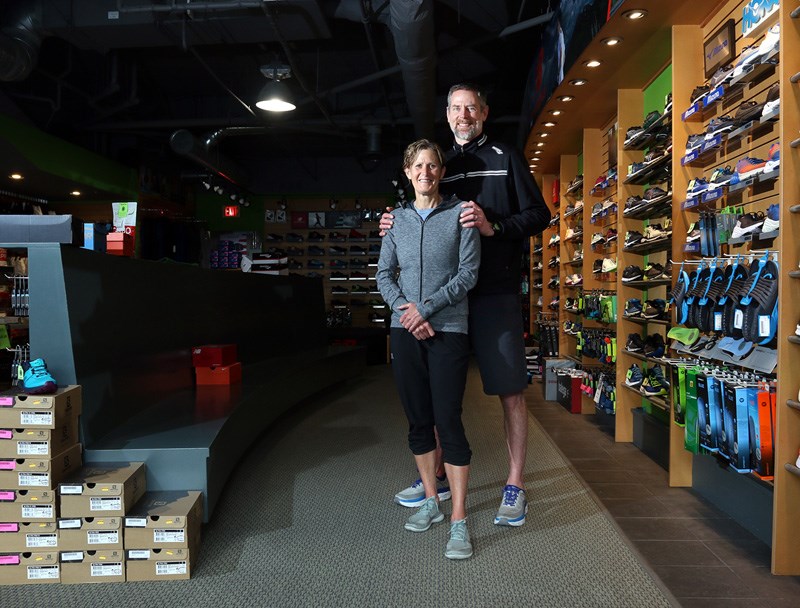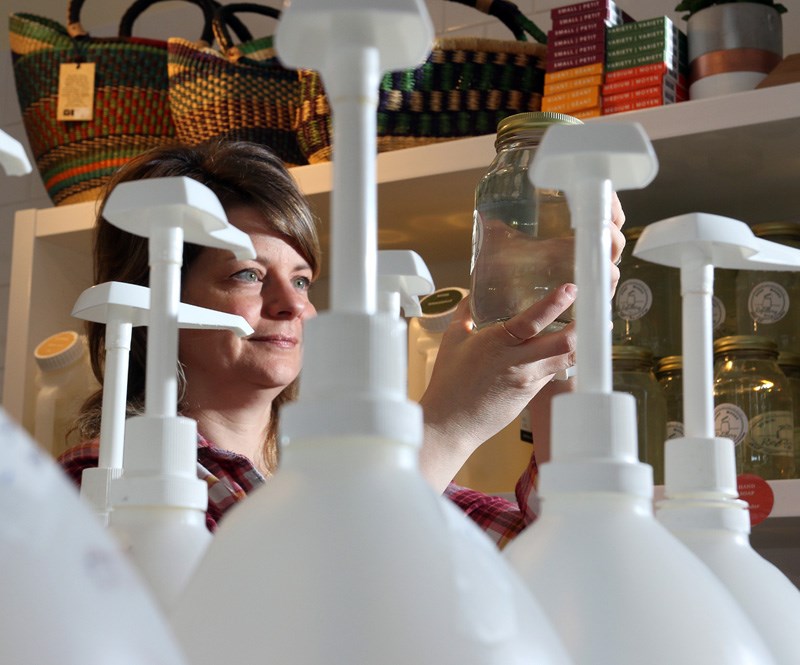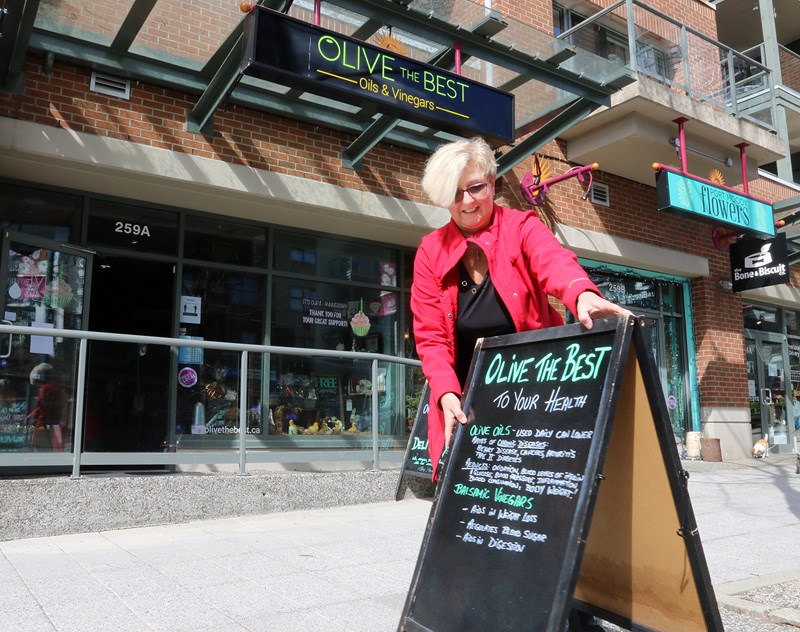There are more than 11,000 businesses in the Tri-Cities.
And while the COVID-19 pandemic has forced several to close with no certainty when they might reopen, many others have found new ways to operate so they can keep safely connected to their customers. It’s a scenario even the most-prepared entrepreneur couldn’t have anticipated when drawing up their business plan.
The Tri-City News is visiting some of those businesses over the next few weeks to learn about the lessons they’re learning, the challenges they’ve faced and overcome, and those that still lie ahead. This week, we stopped in at Newport Village in Port Moody.
The Village Toy Shop
If you’ve got the time, and the space, The Village Toy Shop in Port Moody’s Newport Village has an 18,000-piece puzzle that should consume a good amount of your self-imposed isolation.
Teresa Johansson, who’s run the shop for five years, said puzzles have regained popularity as people stay home to wait out the public health crisis. Her 1000-piece puzzles are all sold out, and even the 5,000 and 9,000-piece pictures are gone from the little corner shop.
Johansson said many of the puzzles have been acquired for elderly parents who’ve chosen to stay home to minimize their chances of exposure to the novel-coronavirus that causes COVID-19.
And with the store closed to walk-in customers, those puzzles are being discovered and sold online for pickup, an option Johansson and her husband, Tom, were able to implement in a couple of hours through the Shopify web portal.
She said she’d always resisted going online because the shop has always relied on personal service and getting to know the families it serves in the ongoing battle against big box retailers.
But with the arrival of COVID-19, the business “flipped on its head,” Johansson said.
The Runner’s Den
Paul Slaymaker said the hardest part of COVID-19’s arrival was laying off The Runner’s Den’s staff of three full-time employees and an equal number of part-timers.
He said he only made that decision when it was apparent interim solutions to conducting business at a time of physical distancing and self-isolation, like leaving shoes on the floor for customers to try on themselves, weren’t working.
“We needed to make the right decision,” Slaymaker said of closing the shop to walk-in traffic.
Instead, he and his wife, Penny Plamandon, have been working to maintain the personal connections with the shop’s community of runners and walkers that’s been forged over more than 20 years.
While runners who know their shoe brand and size can phone in an order and pick it up at the front door, along with pretty much any other item in the store, fitness advice and training plans are now being dispensed via e-mail blasts, and some runners are scratching their competitive itch by preparing for virtual marathons.
Slaymaker said COVID-19 is forcing other decisions upon the way he conducts business, like finally working on a website to showcase the products and brands he sells, even if he ultimately decides online sales aren’t a good fit.
“It puts the impetus on us to find new ways to reach the customer,” he said.
The Refillery
Liquid soaps and cleaning products are hot-ticket items in these pandemic days. How Julie Veres sells them — and the primary reason for her business existing — is not.
Veres started The Refillery as an adjunct to her paper and greeting card shop in Newport Village to give people an option to consume products like soap, shampoos and household cleaners responsibly. She sells them in containers that can be refilled rather than pitched into the garbage where they end up in landfills.
But fears of transmitting the novel coronavirus that causes the COVID-19 respiratory illness have made the use of refillable containers a risk.
Instead, Veres is selling her products in large glass mason jars that can be returned for a refund of a deposit and then sterilized.
The rest of Veres’ shop remains open to walk-in customers as well, albeit with limited numbers allowed to enter at any one time.
The pandemic has also pushed her to accelerate a plan to open an online version of her shop from a goal for the year to one that was completed in about three days.
As well, Veres launched a service for the greeting cards she sells; for an extra fee, she’ll handwrite a personal note and post the card to its recipient.
Deciding to do business digitally wasn’t easy, Veres said, because she values the personal interaction with her customers so much.
“It’s survival,” she said. “It’s still better to keep working than being at home.”
Olive the Best
Daniela Hammond had big plans for celebrating the first anniversary of her Olive the Best shop that sells olive oils, artisanal balsamic vinegars and gourmet food products. Her suppliers were going to provide samples for customers to try, she was going to host special tastings and Victoria author and renowned olive oil sommelier, Emily Lycopolus was going to come in for a couple of talks.
The shindig was planned for March 22 — the same day cities across the province started closing outdoor facilities and restaurants and bars were required to shut down all dine-in operations because of the COVID-19 pandemic.
Hammond scrambled to transition her business so she could get her product to her customers even if they couldn’t get to her. She dropped her minimum order for free shipping to $20 and she started doing drop-offs to the homes of local shoppers.
Hammond said those visits, however brief and safely-distanced, are the salve that’s getting her through the absence of day-to-day interactions where she can talk about her oils and balsamics.
“When I see people at deliveries, it carries me through the next days as well,” she said, “Talking to people, educating them is what really lights my fire.”
Hammond also does curbside pickups, and limited customers are still allowed in the store, although her procedures to facilitate tastings have been altered and she has to spend every evening wiping everything down with antiseptic cleaners.
She said she hopes the effort will allow her business to weather the pandemic because she feels opportunity awaits on the other side.
“There’s going to be a greater appreciation for gathering around,” Hammond said, adding with people cooking at home more, they’re making the effort to learn about healthier eating options so they can help ensure their own health.
—————————
Are you an independent business navigating the COVID-19 pandemic in an interesting and innovative way? Let us know.






